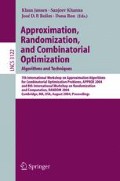Abstract
A quantum encryption scheme (also called private quantum channel, or state randomization protocol) is a one-time pad for quantum messages. If two parties share a classical random string, one of them can transmit a quantum state to the other so that an eavesdropper gets little or no information about the state being transmitted. Perfect encryption schemes leak no information at all about the message. Approximate encryption schemes leak a non-zero (though small) amount of information but require a shorter shared random key. Approximate schemes with short keys have been shown to have a number of applications in quantum cryptography and information theory [8].
This paper provides the first deterministic, polynomial-time constructions ofquantum approximate encryption schemes with short keys. Previous constructions [8] are probabilistic – that is, they show that if the operators used for encryption are chosen at random, then with high probability the resulting protocol will be a secure encryption scheme. Moreover, the resulting protocol descriptions are exponentially long. Our protocols use keys of the same length as the probabilistic constructions; to encrypt n qubits approximately, one needs n+o(n) bits of shared key [8], whereas 2n bits of key are necessary for perfect encryption [3].
An additional contribution of this paper is a connection between classical combinatorial derandomization and constructions of pseudo-random matrix families in a continuous space.
Access this chapter
Tax calculation will be finalised at checkout
Purchases are for personal use only
Preview
Unable to display preview. Download preview PDF.
References
Alon, N., Bruck, J., Naor, J., Naor, M., Roth, R.: Construction of asymptotically good low-rate error-correcting codes through pseudo-random graphs. IEEE Transactions on Information Theory 38, 509–516 (1992)
Alon, N., Goldreich, O., Håastad, J., Peralta, R.: Simple Construction of Almost k-wise Independent Random Variables. Random Structures and Algorithms 3(3), 289–304
Ambainis, A., Mosca, M., Tapp, A., de Wolf, R.: Private Quantum Channels. In: FOCS, pp. 547–553 (2000)
Barnum, H., Crépeau, C., Gottesman, D., Smith, A., Tapp, A.: Authentication of Quantum Messages. In: FOCS, pp. 449–458 (2002)
Bennett, C., Hayden, P., Leung, D., Shor, P., Winter, A.: Remote preparation of quantum states. ArXiv e-Print quant-ph/0307100
Ben-Sasson, E., Sudan, M., Vadhan, S.P., Wigderson, A.: Randomness-efficient low degree tests and short PCPs via epsilon-biased sets. In: STOC, pp. 612–621 (2003)
Dodis, Y., Smith, A.: Encryption of High-Entropy Sources (2003) (manuscript)
Hayden, P., Leung, D., Shor, P., Winter, A.: Randomizing quantum states: Constructions and applications. Comm. Math. Phys. Also ArXiv e-print quant-ph/0307104 (to appear)
Leung, D.: Personal communication (2004)
Naor, J., Naor, M.: Small-Bias Probability Spaces: Efficient Constructions and Applications. SIAM J. Comput. 22(4), 838–856 (1993)
Nielsen, M., Chuang, I.: Quantum Computation and Quantum Information. Cambridge University Press, Cambridge (2000)
Russell, A., Wang, H.: Hong Wang. How to Fool an Unbounded Adversary with a Short Key. In: Knudsen, L.R. (ed.) EUROCRYPT 2002. LNCS, vol. 2332, pp. 133–148. Springer, Heidelberg (2002)
Author information
Authors and Affiliations
Editor information
Editors and Affiliations
Rights and permissions
Copyright information
© 2004 Springer-Verlag Berlin Heidelberg
About this paper
Cite this paper
Ambainis, A., Smith, A. (2004). Small Pseudo-random Families of Matrices: Derandomizing Approximate Quantum Encryption. In: Jansen, K., Khanna, S., Rolim, J.D.P., Ron, D. (eds) Approximation, Randomization, and Combinatorial Optimization. Algorithms and Techniques. RANDOM APPROX 2004 2004. Lecture Notes in Computer Science, vol 3122. Springer, Berlin, Heidelberg. https://doi.org/10.1007/978-3-540-27821-4_23
Download citation
DOI: https://doi.org/10.1007/978-3-540-27821-4_23
Publisher Name: Springer, Berlin, Heidelberg
Print ISBN: 978-3-540-22894-3
Online ISBN: 978-3-540-27821-4
eBook Packages: Springer Book Archive

